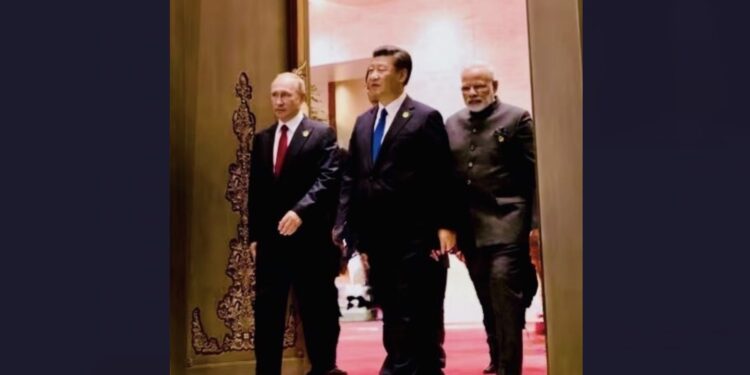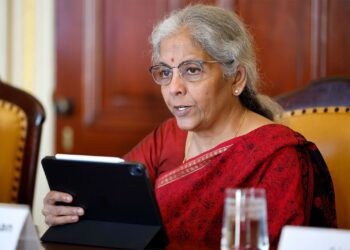India in the World
- On the 5th of September, US President Donald Trump posted a picture of Prime Minister Narendra Modi with Russian President Vladimir Putin and Chinese President Xi Jinping from the Shanghai Cooperation Organisation (SCO) summit commenting that it looks like the US “has lost India and Russia to deepest, darkest China”. The Indian Ministry of External Affairs said in its weekly press briefing that New Delhi rejects the “inaccurate” and “misleading” statements made by the White House trade adviser Peter Navarro criticizing India’s purchase of Russian oil. Shortly after Trump’s remarks, in a Bloomberg interview, US Commerce Secretary Howard Lutnick said that he expects India to apologize and resume trade talks with the US within one or two months, adding that India needs to “decide which side it wants to be on”.
- On the same day, the Finance Minister Nirmala Sitharaman confirmed that, based on economic and commercial considerations, Delhi will continue to buy oil from Moscow. “Whether it is Russian oil or anything else, it’s our decision to buy from the place which suits our needs whether in terms of rate and logistics” Sitharaman said during an interview. The Minister of Finance’s remarks came on the day Brazil’s President Lula called a virtual meeting of BRICS leaders on the 8th of September to figure out a response to the Trump administration’s tariffs. Delhi has decided that Modi will not join the virtual meeting; External Affairs Minister S Jaishankar will instead attend. While there was no public reason given for the PM’s absence, it is seen as part of New Delhi’s balancing act, especially after the reception to his participation in the SCO summit.
- On the 10th of September, Prime Minister Narendra Modi condemned the Israeli missile strike as an infringement of Qatar’s sovereignty. In a post on X, Modi wrote he had expressed concerned to the Emir of Qatar and declared that “India condemns the violation of the sovereignty of the brotherly State of Qatar”. The PM also stressed that India stood for resolving issues “through dialogue and diplomacy” and “firmly in support of peace and stability in the region”.
- On the 17th of September, the European Commission and the EU High Representative disclosed the new “strategic EU-India agenda”, set out to strengthen cooperation with India on defence and trade. “In an increasingly complex geopolitical and geoeconomic environment, closer EU-India cooperation is more important than ever”, the joint communication said. The initiative comes as the EU faces pressures from the United States to sanction India and China over purchases of Russian crude. EU foreign police chief Kaja Kallas described security and defence as a central pillar of the partnership but noted that New Delhi’s ties with Moscow are a potential risk to the partnership’s expansion and that some EU commissioners still had “hesitations” “because, ultimately, our partnership is not only about trade, but also defending rules-based international order”, she said at a press conference in Brussels.
- On the 18th of September, US President Donald Trump, during his visit to the United Kingdom, said he is “very close” to India and shares a strong personal relation with Prime Minister Narendra Modi. During a joint press conference with UK Prime Minister Keir Starmer, President Trump also reiterated his claim of “intervening and settling” the standoff between India and Pakistan earlier this year, using trade as a strategy to defuse the escalating hostilities between the two countries in the aftermath of Operation Sindoor. India has consistently denied any third-party intervention and has maintained that the understanding on cessation of hostilities with Pakistan was reached following direct talks between the Directors General of Military Operations (DGMOs) of the two militaries.
Civil society, human rights defenders, and journalists
- On the 4th of September, Akhtar Hussain, an activist of Raijor Dal, a political party based in the state of Assam, was arrested by the Dhubri Police and detained in connection with protests against a massive eviction drive in the town of Bilasipara that took place in July 2025. The arrest happened a day after Hussain was stopped by police while attempting to visit the villages where the eviction drive had taken place. The eviction was carried out to clear land for a proposed 3,400 MW thermal power plant and left 1,400 homes demolished and around 2,000 Miya Muslim families displaced. Ashraful Islam, a Raijor Dal leader, alleged that “Akhtar Hussain has been deliberately and democratically raising his voice for justice for the victims of the evictions. To silence his dissenting and powerful voice, the administration is filing false cases against him.” With Hussain’s arrest, Raijor Dal leaders say that they expect further crackdowns on activists raising questions about the eviction drives.
- On the 8th of September, Mehraj-ud-Din Malik, a member of the Jammu and Kashmir legislative assembly from the Aam Aadmi Party (AAP), was arrested by the police under the Public Safety Act (PSA). The PSA is a controversial law, defined as a “lawless law” by Amnesty International, that allows people to be held in detention without trial for up to two years if they are considered a threat to “public order”. Following his arrest, protests broke out, with Malik’s supporters demanding his immediate release. Political parties across Jammu and Kashmir condemned the move, calling it an attack on democracy and a way to silence dissent. This is the first time since the revocation of Article 370 in 2019, which removed Jammu and Kashmir’s special constitutional status, that an elected legislator has been detained under the PSA. Condemning Malik’s detention, Peoples’ Conference chairman Sajad Leone said that it was “another assault on the democratic fabric of Jammu and Kashmir.” Critics argue the arrest shows how democratic space in the region has narrowed, with opposition voices increasingly suppressed.
- On the 13th of September, a group of journalists, activists and advocates gathered in Kochi, Kerala, to voice concerns about the increasing crackdown on journalists and their arbitrary arrests. The meeting was organized as part of an ongoing campaign to demand the release of journalist Rejaz M. Sheeba Sydeek, who was arrested by the Maharashtra Anti-Terrorism Squad (ATS) on the 7th of May. Shortly after the meeting, the Kerala Police registered a case against the event’s organizers and speakers. Despite having permission to hold the event, the Kochi Police booked them under several sections of the Bharatiya Nyaya Sanhita (India’s criminal code) and the Kerala Police Act for “unlawful assembly” and “for obstructing police from performing their duties”; allegations that were denied by the organizers of the event. One of the speakers stated that the Kerala government, with this intervention, is sending a clear message: “You can’t speak up for the wrongs happening to Muslims. Rejaz (the arrested journalist) is clearly targeted for his identity, and we pointed that out in our speeches. He had been reporting on the state agencies’ crackdown on Muslim and other marginalized communities, among other issues”. Another senior journalist said the Kerala government has increasingly become averse to any form of dissent. This incident highlights growing concerns over press freedom and the shrinking space for dissent in India, raising urgent questions about the protection of journalists and the right to peaceful assembly.
- On the 24th of September, an independent Indian news website published an article regarding the situation of the activists jailed under the Unlawful Activities (Prevention) Act (UAPA) in connection with the alleged conspiracy behind the February 2020 Delhi riots. The UAPA, India’s anti-terror law, has been criticized for being misused to suppress dissent and political opposition. Umar Khalid and other activists have now spent five years in jail, accused of inciting riots in the capital, yet no trial has begun. Instead, hearings have been repeatedly adjourned and bail consistently denied, even though “bail is the rule and jail the exception”. This could be for one of the two reasons: either the state does not have a strong case to prosecute, or it simply intends to use the UAPA to keep the accused imprisoned indefinitely. The denial of bail and the interminable delay in beginning the trial do not project the majesty of a confident state, but rather its frightened escapism.
Hate Crimes and Hate Speech against Minorities
- On the 6th of September, a Muslim hawker in West Bengal was stabbed by three men who allegedly tried to force him to chant “Jay Shri Ram”, a slogan associated with Hindu identity. After the attack, the assailants allegedly threatened the man, warning him that if he went to the hospital for treatment, they would kill him. On the 7th of September, superintendent of police, Bankura (headquarters) Siddharth Dorji issued a press statement to the media about the attack declaring that “allegations about forcing the victim to chant religious slogans remain unsubstantiated”. This incident is not isolated but part of a rising trend of religiously motivated violence in India.
- In September, the Association for Protection of Civil Rights (ACPR) published a report on the number of hate crimes recorded between June and August 2025, which accounted for 141 reported hate crimes, 102 incidents of hate speech and a surge in attacks targeting religious symbols and places of worship. The report alsport also highlights that legal protections have proven inadequate, with data showing that only 22 out of 141 hate crimes and 4 out of 102 hate speech incidents have resulted in FIRs. The data from these three months also highlights a continuing trend of normalization of hate speech in Indian politics: of the 102 reported hate speech incidents, the majority were made at public rallies and gatherings, with explicit incitement to violence against minorities.
- On the 28th of September, Hindutva activist Pragya Singh Thakur declared, during a Durga Vahini (the women’s wing of Bajrang Dal) event, that Hindu women should avoid Muslim men and refuse household help from them. Thakur also said, “When the enemy (Muslims) comes, they should be cut in half”, effectively calling for violence. She further suggested avoiding food from Muslim-run shops near temples, stating that when these people “selling prasad (religious offerings) near our temples are caught, they should be trashed and handed over to law enforcement”. Thakur’s remarks have triggered strong political backlash: politicians of the opposition condemned her statements and accused the BJP of deliberately fueling anti-Muslims tensions to divert attention from pressing issues. Thakur’s remarks form part of a long-standing pattern of inflammatory statements and hate speech targeting Muslims, often calling for violence against perceived “enemies”, and promoting boycotts of Muslims.
Religious Freedoms and Minority Rights
- On the 2nd of September, the Union Home Ministry issued an order in relation to the Immigration and Foreigners Act, 2025 stating that members of minority communities from Afghanistan, Bangladesh and Pakistan including Hindus, Sikhs, Buddhists, Jains, Parsis and Christians who arrived in India until the 31st of December 2024 to avoid religious persecution will be allowed to stay in the country without a passport or other travel documents. Earlier, the Citizenship Amendment Act (CAA), which came into force last year, only applied to those who came to India on or before the 31st of December 2014 for eligibility to acquire citizenship. The order does not provide citizenships, but allows Hindus, Parsis, Sikhs, Buddhists, Jains and Christians purportedly fleeing persecution from India’s Muslim-majority neighbours – namely, Pakistan, Afghanistan and Bangladesh – to stay in the country. The exclusion of Muslims from the Act’s provisions has sparked concerns and protests from thousands of citizens across the country.
- On the 15th of September, the account “BJP Assam Pradesh” posted on X an AI-generated video captioned “Assam without BJP” with a series of AI-generated images appear, including: a man in a skull cap cutting meat by the road; Assam Congress Chief Gaurav Gogoi and Senior Congress leader Rahul Gandhi standing in front of the flag of Pakistan; men in skullcaps and women in burqas and hijabs at different locations such as tea gardens, airport, an amusement park and a stadium in Guwahati and walking across a border fence, with the label ‘illegal immigrants’. The video- defined by journalists as a “textbook example of fearmongering for votes”- ends with a text saying “90% Muslim population”, followed by “Choose your vote carefully”, an underlying message to voters is that if any other party (than then BJP) comes to power, Muslims will be allowed to live following their religion. This is not only a violent message to the Muslim community in Assam, but also a violation of the Representation of the People Act, 1951. Both Section 123(3A) and Section 125 prohibit appeals on religious grounds and promotion of enmity during elections, yet no action has been taken by the Election Commission until now.
- On the 30th of September, the Election Commission of India released Bihar’s final electoral list after the three-month long Special Intensive Revision (SIR). The final count of voters revealed that 47 lakh voters, who were on the rolls as of June 2025, have been excluded from the final electoral roll. The exercise has been criticized as an attempt to validate citizenship under the pretext of updating electoral rolls, and as a way to introduce the National Register for Citizens (NRC) indirectly. The Supreme Court is scheduled to hear the final arguments in the case against the SIR on October 7. In its previous hearing, the court stated that even if the voter list is published, it can still step in if any illegality is found.
Internet and Technology
- India’s massive IT sector is facing a lengthy period of uncertainty with customers delaying or re-negotiating contracts while the United States is considering a 25% tax on American firms using foreign outsourcing services, analysts and lawyers said. India $283 billion information technology sector has thrived for more than three decades exporting software devices, with prominent clients including Apple, American Express, Cisco.
- On the 19th of September, US President Donald Trump disclosed that a $100,000 fee will be imposed on new H-1B visas from the 21st of September. H-1B is a classification of non-immigrant visa in the US that allows US employers to hire foreign workers in specialized fields. People born in India are the largest beneficiaries of the program, with data showing that Indians account for more than 70% of all H-1B petitions approved each year since 2015. This move has caused confusion and worry between IT companies, both Indian and American. Major employers like Microsoft, Amazon and JPMorgan urgently advised staff on H-1B visas outside the country to return to the US before the 21st of September deadline. The Indian government issued a statement expressing concern that the measure is “likely to have humanitarian consequences by way of disruption caused for families”.
Political Parties
- On the 1st of September, the Supreme Court asked the Bihar legal services authority to deploy para-legal volunteers to help voters and political parties file claims and objections in the state’s Special Intensive Revision (SIR) of electoral rolls. The volunteers have been asked to submit confidential reports to district judges, which will be reviewed on the 8th of September. Meanwhile, the Rashtriya Janata Dal (RJD) party has criticised the exercise as precipitous and argued that it might disenfranchise vulnerable voters by disallowing commonly used documents like Aadhaar and ration cards. RJD had sought an extension of the deadline for claims and objections in the poll revision exercise ahead of elections in Bihar. The EC responded that many objections filed by political parties were for exclusion rather than inclusion.
- On the 28th of September, The Reporters’ Collective published an investigation in which it denounces repeated attempts to purge nearly 80,000 Muslim voters from Bihar’s Dhaka constituency electoral roll by wrongfully claiming that all of them are not Indian citizens. This large-scale and targeted voter deletion effort sought to wrongfully remove about 40% of eligible voters in Dhaka, a border constituency on East Champaran that the BJP wrested from the RJD in the 2020 assembly elections by just over 10,000 voters against the total polled 208,000 votes. To get these Muslim voters deleted, formal written submissions were made to the Election Commission of India’s (ECI) district officer (Electoral Registration Officer) and to the Chief Electoral Officer (CEO) of Bihar, one of them in the name of the personal assistant of the Bharatiya Janata Party (BJP)’s MLA from Dhaka. The Reporters’ Collective established that this was a systematic and targeted attempt to single out and delete Muslim voters in the Dhaka constituency. The sitting BJP MLA did not respond to these revelations.
Police and authorities
- On the 4th of September, the Rajasthan police demolished the reported illegal properties of three men who are accused of murdering a farmer for opposing illegal poaching. According to the police, the deceased farmer, Khet Singh, had tried to stop hunters from killing deer, and in retaliation, the accused allegedly attacked him with sharp weapons. On the 5th of October, Jaisalmer district authorities demolished five illegal shops linked to the accused and removed fencing from a large area of land that the administration said the accused had encroached upon. The murder of Singh had triggered tension in the region, with protests arising. The police used lathicharge and tear gas to disperse the crowd and detained over two dozen protestors. In a strong rebuke of the practice known as “bulldozer justice”, the Supreme Court ruled in November last year that it is entirely unconstitutional to demolish a person’s house without following due legal process, merely on the basis of an accusation or conviction in a criminal case.
Judiciary
- On the 2nd of September, the Union Home Ministry issued an order in relation to the Immigration and Foreigners Act, 2025 stating that members of minority communities from Afghanistan, Bangladesh and Pakistan including Hindus, Sikhs, Buddhists, Jains, Parsis and Christians who arrived in India until the 31st of December 2024 to avoid religious persecution will be allowed to stay in the country without a passport or other travel documents. Earlier, the Citizenship Amendment Act (CAA), which came into force last year, only applied to those who came to India on or before the 31st of December 2014 for eligibility to acquire citizenship. The order does not provide citizenships, but allows Hindus, Parsis, Sikhs, Buddhists, Jains and Christians purportedly fleeing persecution from India’s Muslim-majority neighbours – namely, Pakistan, Afghanistan and Bangladesh – to stay in the country. The exclusion of Muslims from the Act’s provisions has sparked concerns and protests from thousands of citizens across the country.
- On the 2nd of September, the Delhi High Court dismissed the bail pleas filed by student activist Gulfisha Fatima and other eight accused people in the 2020 riots “larger conspiracy” case. On the 7th of September, Fatima filed a petition in the Supreme Court challenging the order of the Delhi High Court denying her bail. Fatima, who was in the forefront of organising protests against the Citizenship Amendment Act, was arrested on the 9th of April 2020, and has been under custody ever since over allegations under the Unlawful Activities Prevention Act (UAPA).
- On the 17th of September, Delhi courts acquitted the accused in at least 17 cases related to the 2020 Delhi riots citing “fabricated” evidence, “fictitious” witnesses, and “foisted” cases. A review of 93 acquittal orders by an Indian newspaper revealed a clear pattern of judicial censure. In nearly one of every five cases, judges flagged serious misconduct by the Delhi Police. Of the 116 riots cases with verdicts delivered, 97 have ended in acquittals. In at least 12 orders, judges found police had introduced “artificial” witnesses or apparently “fabricated” evidence. In two other cases, witnesses testified that police officials had dictated their statements. “Such instances lead to serious erosion of the faith of the people in the investigating process and the rule of law”, said a judge on the matter. These judicial rebukes suggest a systemic failure in the investigation into one of the city’s worst episodes of communal violence.
- On the 18th of September, a Delhi court stayed the ex parte order restraining several journalists from publishing stories “defaming” Adani Enterprise Limited (AEL). The issue goes back to the 6th of September, when the court of Rohini, a city in Northwest Delhi, passed an ex parte interim order directing a number of journalists and activists to remove articles and social media posts allegedly defaming AEL and to not publish such material against the firm until the next hearing. Journalist bodies have expressed concern and disappointment over the ex parte order as well as for the formal request to take down material that mentioned the Adani Group. On X, the Press Club of India defined the ex parte order as an “act of egregious judicial overreach”, saying that “the court has put its stamp on the power to impose unrestrained censorship in the hands of corporate entities”. The journalist body added that the order is unprecedented in its scale and scope for its potential misuse to silence the press. The Editors Guild of India (EGI) also commented on the episode, saying that “they risk chilling legitimate reporting, commentary, and satire, and undermine the fundamental right to freedom of speech and expression”. EGI called free press an essential feature of democracy and added that any system that allows private interests to unilaterally silence critical or uncomfortable voices poses a serious risk to the public’s right to know.
Business & economy
- On the 15th of September, Prime Minister Narendra Modi inaugurated a 2,4000 MW coal-based thermal power plant in Pirpainty, Bhagalpur, Bihar, as part of multiple development projects aimed at making the state self-reliant in energy. The Rs 25,000 crore project (approximately €2.7 billion) will be built, owned and operated by Adani Power Ltd, a subsidiary of the Adany Group, under a 25-year lease of 1,020 acres of land at Rs1 per acre per year (approximately €0.012 per acre). Villagers have raised concerns over inadequate compensation for their agricultural lands, many of which were previously acquired by the state. Villagers also alleged that some who tried to go to Bhagalpur to meet PM Modi during his visit to the city on the 15th of September to talk about these concerns were arrested and prevented from meeting him. Farmers worry that, while they may receive a one-time compensation, they will lose their means of livelihood. Some villagers told to journalists that the state government had listed those lands as “barren” when they took over the plots for power plants, although the plantations of mango and litchi present in the area are vital for local livelihoods. The project has also sparked criticism on environmental and health grounds, as a new coal-fired plant is expected to worsen air pollution, arsenic contamination and associated health problems.
Compiled by Diaspora in Action for Human Rights and Democracy.











